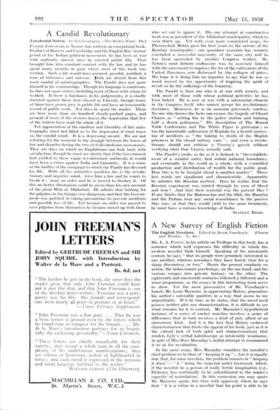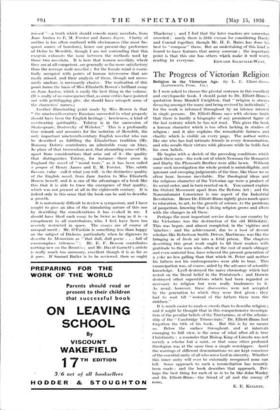A New Survey , of English Fiction Ma. L. A. PAVEr,
in his article on Trollope in this book, has a sentence which well expresses the difficulty in which the modern novelist finds himself. Speaking of the nineteenth century he says " that its people were genuinely interested in one another, whereas nowadays they have barely time for a sharp discourtesy or two." Hence the present emphasis on action, the behaviourist psychology, -on the one hand, and the various escapes into private fantasy, on the other. The eighteenth and nineteenth centuries followed a different and a wiser programme, as the essays in this interesting book serve to show. Yet the most provocative of Mr. Verschoyle's bunch, Mr. Louis Macneice, in appreciating Malory, generalises his author's ostensible qualities in a way that seems to me unjustifiable. If it be true, as he states, that the novel need possess neither plot nor characterisation, it is difficult to see what remains -for it to contain. Mr. Macneice's hypothetical instance of a series of cricket matches involves a series of differences that in turn involves a kind of plot, albeit of an elementary kind. And it is the fact that Malory eschewed characterisation that limits the appeal of his book, just as it is the virtual lack of both (plot and characterisation) that renders Lyly's verbal kaleidoscope so intolerably wearisome, in spite of Miss Rose Macaulay's skilful attempt to recommend it to us for revaluation.
In the same essay, Miss Macaulay considers the novelist's chief problem to be that of " keeping it up " ; but it is equally true that, for some novelists, the problem consists in " keeping it down"—" it " being the material under treatment, which, if the novelist be a person of really fertile imagination (e.g., Dickens), has continually to be subordinated to the reader's capacity of assimilation, In this connexion one may quote Mr. Macneice again, this time with approval, where he says that " it is a virtue in a novelist that his point is able to be
missed "—a truth which should console many novelists, from Jane Austen to E. M. Forster and James Joyce. Clarity of outline is too often confused with obviousness (the most fre- quent source of boredom), hence our present-day preference of Defoe to Meredith, though I am not contending that this exegesis exhausts the issue between the methods used by those two novelists. It is here that women novelists, where they are at all competent, are generally so far more satisfactory than the average male novelist ; for the female mind is essen- tially occupied with points of human intercourse that are easily missed, and their analysis of them, though not neces- sarily unclear, is necessarily elusive. The realisation of this point forms the basis of Miss Elizabeth Bowen's brilliant essay on Jane Austen, which is easily the best thing in the volume. (It is really of no consequence that, as some critics have pointed out with pettifogging glee, she should have n►isspelt some of the characters' names.)
Another illuminating point made by Miss Bowen is that "the nineteenth-century Russians succeeded to what properly should have been the English heritage : heroicness, a kind of Overbearing spirituality. Tolstoy is in the succession of Shakespeare, Dostoevky of Webster." This is a profoundly true, remark and accounts for the isolation of Meredith, the only important nineteenth-century English novelist who can be described as fulfilling the Elizabethan tradition (Mr. Bonamy Dobr6e contributes an admirable essay on him). In place of that tremendous zest, that abounding sense of life, apart from considerations that• arise out of it—the quality that. distinguishes Tolstoy, for instance—there arose in England the novel of " moral taste," as it has been called a propos of Henry James and E. M. Forster. This subtle flavour, value—call it what you will—is the distinctive quality of the English novel, from Jane Austen to Miss Elizabeth Bowen herself, and it is one of the advantages of a book like this that it is able to trace the emergence of that quality, which was not present at all in the eighteenth century. It is indeed only in this sense that the book can be said to describe a growth.
It is notoriously difficult to review a symposium, and I have sought to give an idea of the stimulating nature of this one by describing the considerations it has evoked in me. I should have liked each essay to be twice as long as it is—a compliment to all contributors, who, I feel, have been too severely restricted in space. The essays are of course of unequal merit : Mr. O'Faolain is something less than happy on the subject of Dickens, particularly when he digresses to describe In Memoriam as " that dull, dull poem . . . full of cominonplace triteness " ; Mr. E. F. Benson contributes nothing new on the Brontes ; and Mr. David Garnett's article is really much too summary, excellent though it is as far as it goes. If Samuel Butler is to be reviewed, then so ought Thackeray ; and I feel that the later masters are somewhat crowded : surely there is little excuse for considering Hardy and Conrad together, though Mr. H. E. Bates has done his best to "compose" them. But an undertaking of this kind is bound to have features that annoy someone ; the important point is that this one has others which make it well worth























































 Previous page
Previous page